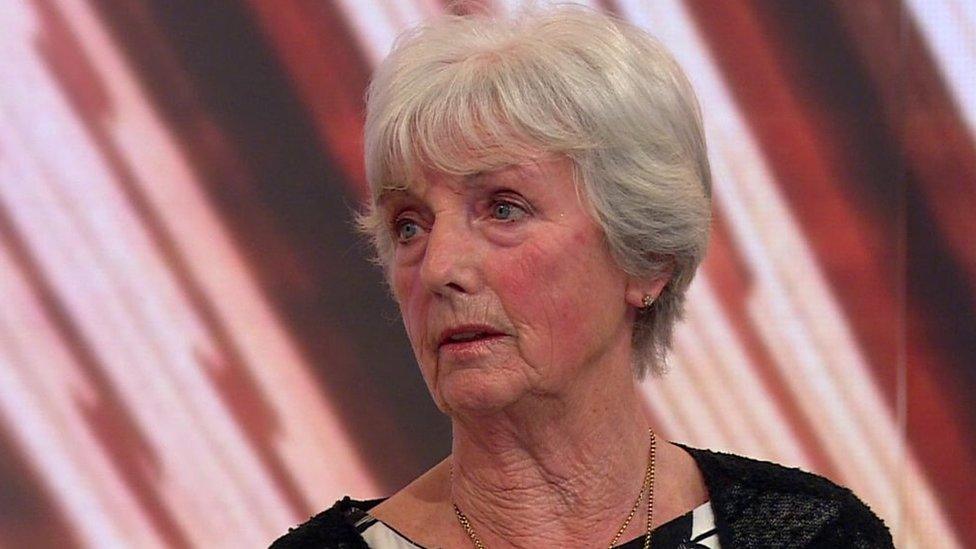Helen McCourt murderer Ian Simms set for parole
- Published

Helen McCourt was murdered by Ian Simms in Billinge, Merseyside, in 1988
The mother of a murder victim is "horrified" her daughter's killer will be freed despite never revealing where her body is.
Ian Simms, 63, was jailed in 1989 for murdering Helen McCourt who disappeared in February 1988 aged 22.
He was originally sentenced to a minimum of 16 years.
The killer was considered for parole for the seventh time on 8 November and officials said he "met the test for release".
Simms killed Ms McCourt as she walked home from work in Liverpool.
Her mother Marie said she was left shaking with anger after receiving a call earlier from her victim liaison officer at the parole board confirming Simms' release.

Ian Simms, seen here in 1988, was jailed for murder
"I'm just in a state of shock to be honest," Mrs McCourt said, from the family home in Billinge near St Helens, Merseyside.
"I've just had some forms come through, I think that's on what grounds the parole board has granted him release on licence, but I don't know all the conditions.
"I was just in shock. I'm still trying to deal with it. I'm horrified by it, I'm horrified by it. This man is a danger."
She has urged the next government to introduce Helen's Law, legislation that would deny parole to killers who do not disclose their victims' remains.
The bill recently ran out of time, when the general election was called.

Analysis
Danny Shaw, BBC home affairs correspondent
It feels wrong, unjust and unfair that a convicted murderer can be freed from jail without giving any clue as to where their victim's body is, but parole decisions are not based on fairness.
They're about assessing objectively whether an offender can be safely managed outside prison after they've served the minimum term, the punishment part, of their sentence.
In Simms' case it appears the Parole Board did consider his refusal to divulge where Helen McCourt's remains are, but weighed that alongside numerous other factors.
It is hard to see, therefore, how Helen's Law would have made a difference in this case. It does no more than "require" the Board to take the non-disclosure of information by an offender into account when determining if they should be let out.
However, the Bill, backed by the Conservatives, Labour and the Liberal Democrats, will be reintroduced when parliament sits again after the election, and when it becomes law may well affect cases in the future - a lasting legacy of Marie McCourt's tireless campaigning.

Simms was denied release at a hearing in 2016, but was subsequently transferred to an open prison "due to progress made", where he has "followed the rules" when granted temporary release.
The Parole Board said it had "carefully considered" Simms' failure to reveal where he concealed Ms McCourt's body and concluded there is "no prospect of Simms ever disclosing the whereabouts of his victim even if he were kept in prison until he died".
The board added the refusal continues to cause understandable distress and misery to the victim's family and the panel concluded this demonstrated a lack of empathy.
But it said denial was not a "necessarily-determining factor" and also considered evidence from two psychologists who recommended release.
'Why should he be let out to torture us some more?'
The Parole Board said: "The progress that Mr Simms has made, the considerable change in his behaviour, the fact that he has not been involved in any violence or substance misuse for many years, his protective factors, the recommendations from all the professionals and all the evidence presented at the hearing, the panel was satisfied that Mr Simms met the test for release."
Mrs McCourt has described not knowing the whereabouts of her daughter's body as "torture".
"If Helen's Law had been on the statute books right now those judges would have to really make sure in their decision to release him that he would be safe.
"They would have to go into that, they would have to obey that law and it hasn't happened."
She added she did not know when or where Simms would be released and had "very little to go on".
Mrs McCourt's fight for justice


February 1988: Helen McCourt, 22, disappeared near her home in Billinge
1989: Ian Simms was found guilty of her murder after blood and an earring - identical to one belonging to her - were found in his car boot
February 1989: He was jailed for life and was told he would have to serve at least 16 years before being considered for parole
February 2004: Simms became eligible to be considered for release from prison
December 2015: Marie McCourt launched a petition calling for a change in the law to ensure killers are not released unless they reveal the location of their victims' bodies
February 2016: Simms was deemed unsuitable for release but it was recommended that he be moved to an open prison. Marie McCourt also visited Downing Street to hand over her petition
October 2016: MPs voted in favour of Helen's Law to deny killers parole if they would not reveal the location of their victims' remains
July 2019: Justice secretary David Gauke confirmed the law would be adopted in England and Wales
October 2019: The bill to enact Helen's Law was presented to the House of Commons after being included in Monday's Queen's Speech. It was expected to become law in spring 2020 but this was prior to the general election
November 2019: Simms was considered for parole for the seventh time and officials said he had "met the test for release"
- Published16 October 2019

- Published16 October 2019

- Published6 July 2019

- Published15 June 2018
